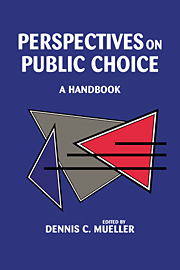Book contents
- Frontmatter
- Contents
- Preface
- Contributors
- 1 Public choice in perspective
- Part I The need for and forms of cooperation
- 2 Economic theories of the state
- 3 Neither markets nor states: Linking transformation processes in collective action arenas
- 4 The political economy of federalism
- 5 The public choice of international organizations
- 6 Constitutional public choice
- Part II Voting rules and preference aggregation
- Part III Electoral politics
- Part IV Individual behavior and collective action
- Part V Public choice in action
- References
- Name index
- Subject index
6 - Constitutional public choice
Published online by Cambridge University Press: 04 May 2010
- Frontmatter
- Contents
- Preface
- Contributors
- 1 Public choice in perspective
- Part I The need for and forms of cooperation
- 2 Economic theories of the state
- 3 Neither markets nor states: Linking transformation processes in collective action arenas
- 4 The political economy of federalism
- 5 The public choice of international organizations
- 6 Constitutional public choice
- Part II Voting rules and preference aggregation
- Part III Electoral politics
- Part IV Individual behavior and collective action
- Part V Public choice in action
- References
- Name index
- Subject index
Summary
Political history is largely an accounting of past events and people. Almost every rendering of the political history of this country gives the impression that specific individuals played important, and often decisive, roles in determining past events: George Washington launched the American democracy; Thomas Jefferson purchased the Louisiana Territory, which defined the geographic dimensions of the United States; Abraham Lincoln preserved the union; and Franklin Roosevelt inaugurated the era of big government during the depression.
The perspective of public choice is, however, directly at odds with this interpretation of political history, for it assumes all men and women seek to advance their own interests and that the political, economic, and social institutions that surround them shape the choices they make in pursuit of that goal. If institutions do not “make the man,” they do, in combination with his goals, determine his actions. Political events are in turn the aggregate consequences of these actions. From the perspective of public choice, political history is an accounting of events and institutions not of specific people and personalities.
Almost all public choice treats political institutions as given constraints on the self-interested actions of individuals. This emphasis on positive analysis also characterizes the contributions to this volume. In this essay, I wish to take up the question of where these institutions come from.
There are two ways to approach this question, one is essentially normative: What political institutions ought a society to choose to advance the individual interests of its citizens?
- Type
- Chapter
- Information
- Perspectives on Public ChoiceA Handbook, pp. 124 - 146Publisher: Cambridge University PressPrint publication year: 1996
- 2
- Cited by



